Unit 6 复习提升课件【大单元教学】人教版七年级英语上册Unit 6 Do you like bananas
文档属性
| 名称 | Unit 6 复习提升课件【大单元教学】人教版七年级英语上册Unit 6 Do you like bananas | 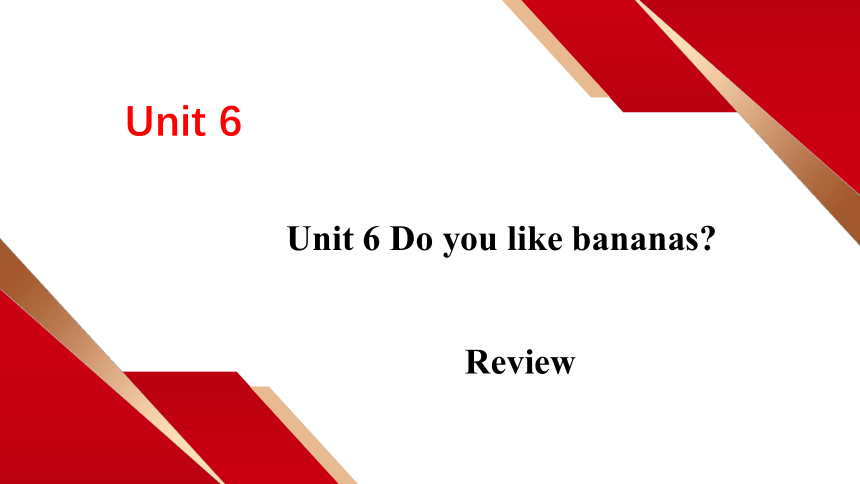 | |
| 格式 | pptx | ||
| 文件大小 | 2.5MB | ||
| 资源类型 | 试卷 | ||
| 版本资源 | 人教新目标(Go for it)版 | ||
| 科目 | 英语 | ||
| 更新时间 | 2023-09-21 12:48:55 | ||
图片预览

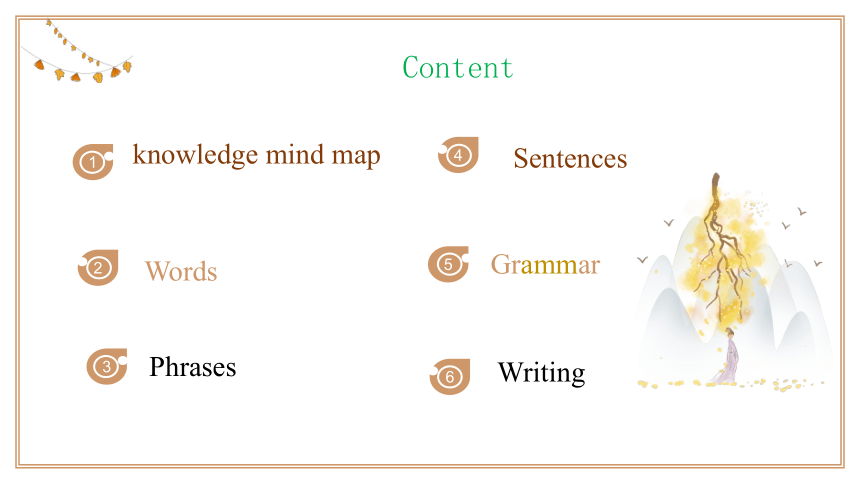
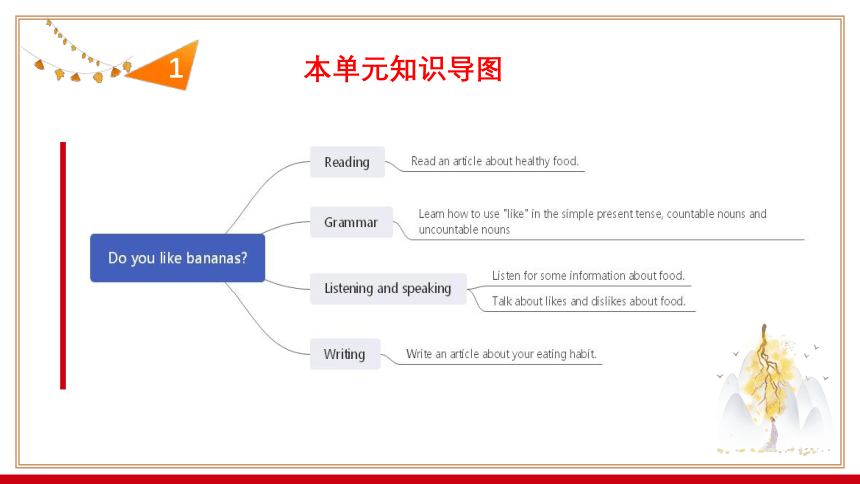
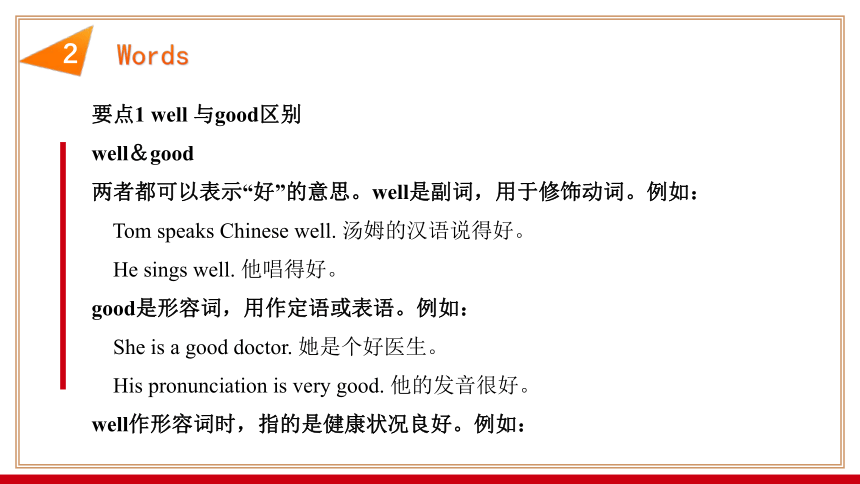
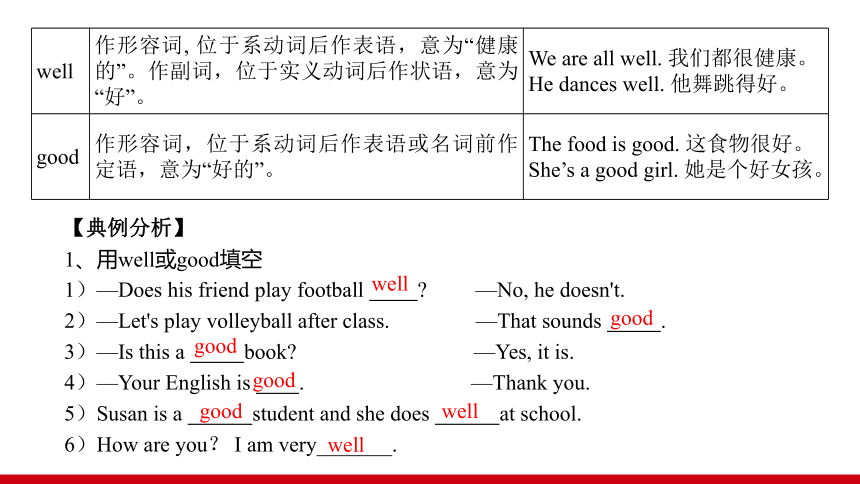
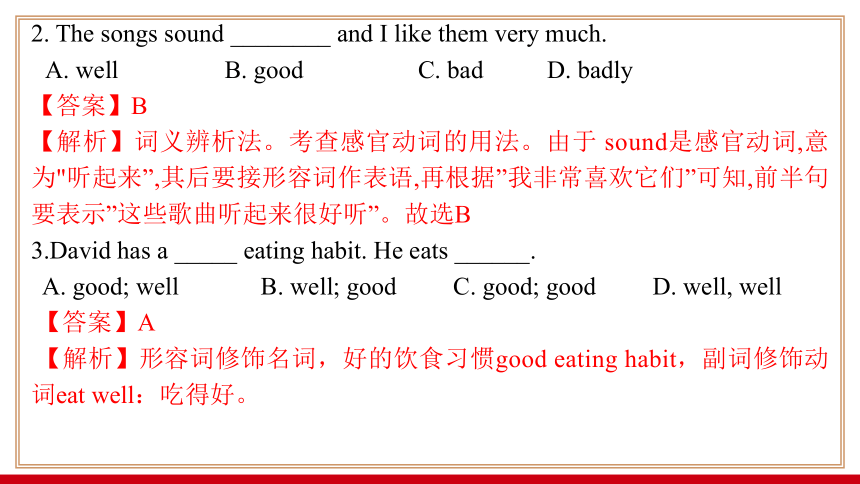
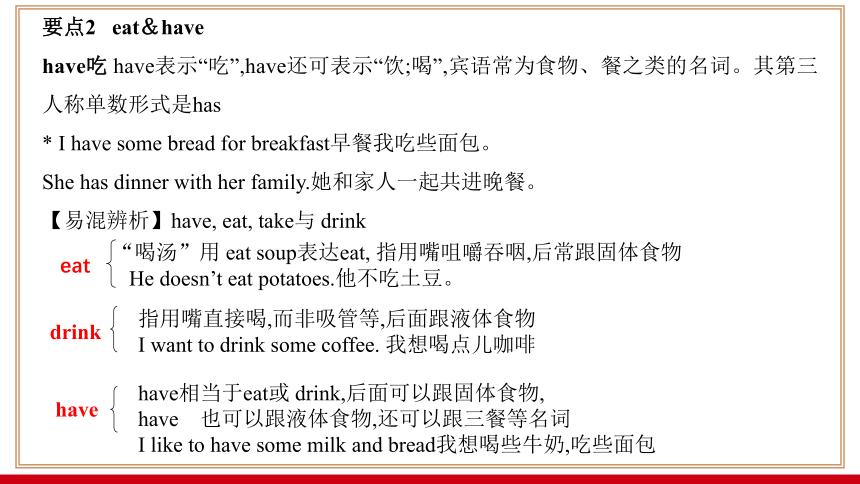
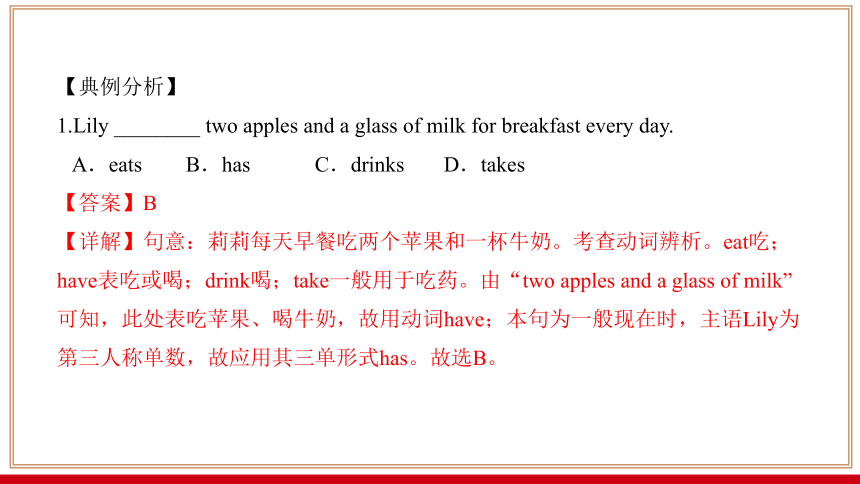
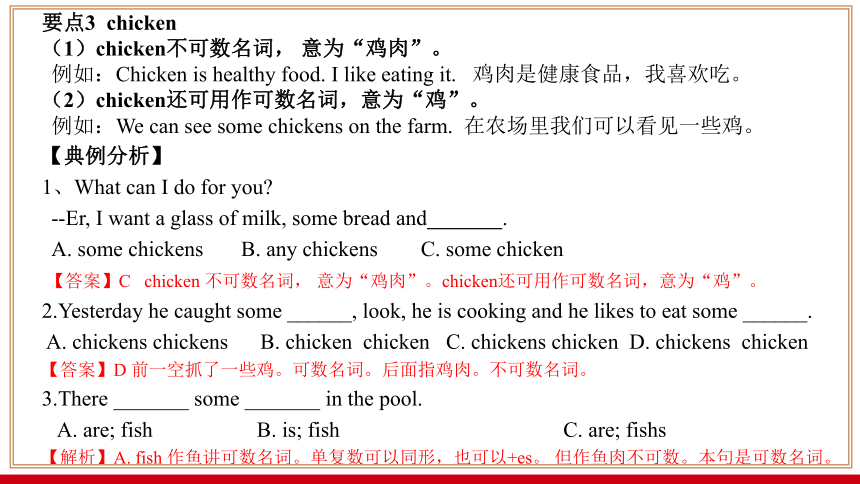
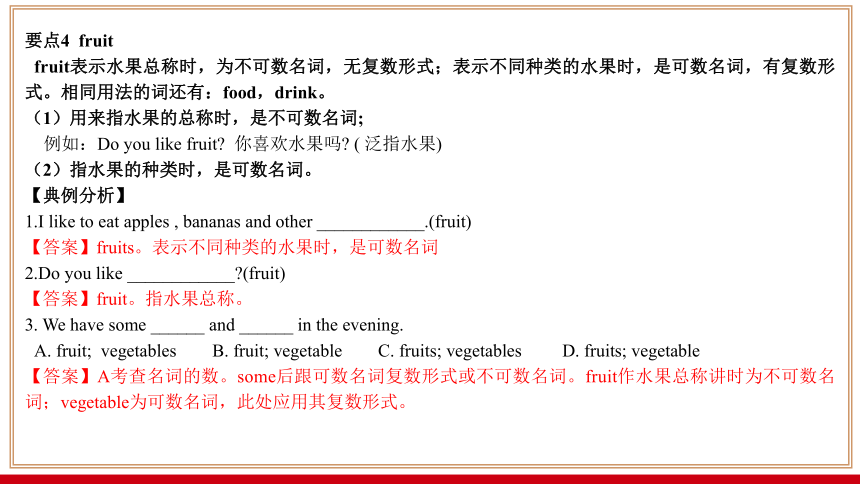
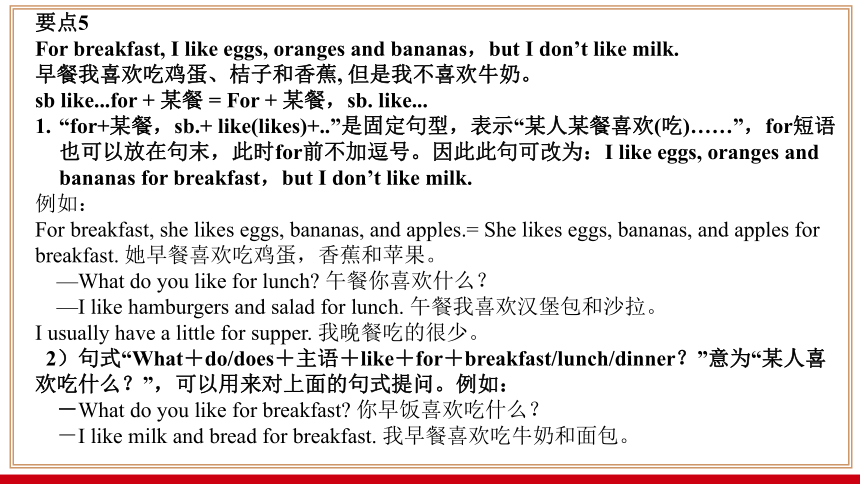
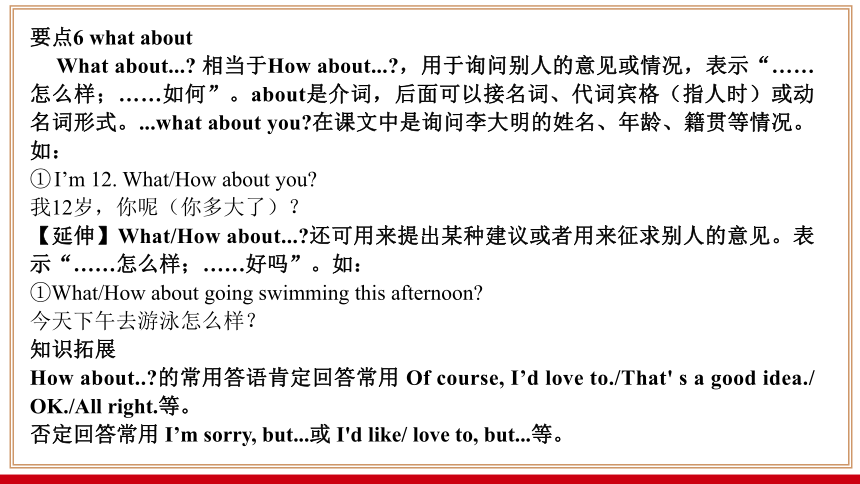
文档简介
(共38张PPT)
Unit 6
Review
Unit 6 Do you like bananas
Words
1
Phrases
2
Sentences
3
4
Content
Writing
5
6
Grammar
knowledge mind map
本单元知识导图
1
Words
2
要点1 well 与good区别
well&good
两者都可以表示“好”的意思。well是副词,用于修饰动词。例如:
Tom speaks Chinese well. 汤姆的汉语说得好。
He sings well. 他唱得好。
good是形容词,用作定语或表语。例如:
She is a good doctor. 她是个好医生。
His pronunciation is very good. 他的发音很好。
well作形容词时,指的是健康状况良好。例如:
well 作形容词, 位于系动词后作表语,意为“健康的”。作副词,位于实义动词后作状语,意为“好”。 We are all well. 我们都很健康。
He dances well. 他舞跳得好。
good 作形容词,位于系动词后作表语或名词前作定语,意为“好的”。 The food is good. 这食物很好。
She’s a good girl. 她是个好女孩。
【典例分析】
1、用well或good填空
1)—Does his friend play football —No, he doesn't.
2)—Let's play volleyball after class. —That sounds .
3)—Is this a book —Yes, it is.
4)—Your English is . —Thank you.
5)Susan is a student and she does at school.
6)How are you? I am very_______.
well
good
good
good
good well
well
2. The songs sound ________ and I like them very much.
A. well B. good C. bad D. badly
【答案】B
【解析】词义辨析法。考查感官动词的用法。由于 sound是感官动词,意为"听起来”,其后要接形容词作表语,再根据”我非常喜欢它们”可知,前半句要表示”这些歌曲听起来很好听”。故选B
3.David has a _____ eating habit. He eats ______.
A. good; well B. well; good C. good; good D. well, well
【答案】A
【解析】形容词修饰名词,好的饮食习惯good eating habit,副词修饰动词eat well:吃得好。
要点2 eat&have
have吃 have表示“吃”,have还可表示“饮;喝”,宾语常为食物、餐之类的名词。其第三人称单数形式是has
* I have some bread for breakfast早餐我吃些面包。
She has dinner with her family.她和家人一起共进晚餐。
【易混辨析】have, eat, take与 drink
“喝汤”用 eat soup表达eat, 指用嘴咀嚼吞咽,后常跟固体食物
He doesn’t eat potatoes.他不吃土豆。
指用嘴直接喝,而非吸管等,后面跟液体食物
I want to drink some coffee. 我想喝点儿咖啡
eat
drink
have
have相当于eat或 drink,后面可以跟固体食物,
have 也可以跟液体食物,还可以跟三餐等名词
I like to have some milk and bread我想喝些牛奶,吃些面包
【典例分析】
1.Lily ________ two apples and a glass of milk for breakfast every day.
A.eats B.has C.drinks D.takes
【答案】B
【详解】句意:莉莉每天早餐吃两个苹果和一杯牛奶。考查动词辨析。eat吃;have表吃或喝;drink喝;take一般用于吃药。由“two apples and a glass of milk”可知,此处表吃苹果、喝牛奶,故用动词have;本句为一般现在时,主语Lily为第三人称单数,故应用其三单形式has。故选B。
要点3 chicken
(1)chicken不可数名词, 意为“鸡肉”。
例如:Chicken is healthy food. I like eating it. 鸡肉是健康食品,我喜欢吃。
(2)chicken还可用作可数名词,意为“鸡”。
例如:We can see some chickens on the farm. 在农场里我们可以看见一些鸡。
【典例分析】
1、What can I do for you
--Er, I want a glass of milk, some bread and .
A. some chickens B. any chickens C. some chicken
【答案】C chicken 不可数名词, 意为“鸡肉”。chicken还可用作可数名词,意为“鸡”。
2.Yesterday he caught some ______, look, he is cooking and he likes to eat some ______.
A. chickens chickens B. chicken chicken C. chickens chicken D. chickens chicken
【答案】D 前一空抓了一些鸡。可数名词。后面指鸡肉。不可数名词。
3.There _______ some _______ in the pool.
A. are; fish B. is; fish C. are; fishs
【解析】A. fish 作鱼讲可数名词。单复数可以同形,也可以+es。 但作鱼肉不可数。本句是可数名词。
要点4 fruit
fruit表示水果总称时,为不可数名词,无复数形式;表示不同种类的水果时,是可数名词,有复数形式。相同用法的词还有:food,drink。
(1)用来指水果的总称时,是不可数名词;
例如:Do you like fruit 你喜欢水果吗 ( 泛指水果)
(2)指水果的种类时,是可数名词。
【典例分析】
1.I like to eat apples , bananas and other ____________.(fruit)
【答案】fruits。表示不同种类的水果时,是可数名词
2.Do you like ____________ (fruit)
【答案】fruit。指水果总称。
3. We have some ______ and ______ in the evening.
A. fruit; vegetables B. fruit; vegetable C. fruits; vegetables D. fruits; vegetable
【答案】A考查名词的数。some后跟可数名词复数形式或不可数名词。fruit作水果总称讲时为不可数名词;vegetable为可数名词,此处应用其复数形式。
要点5
For breakfast, I like eggs, oranges and bananas,but I don’t like milk.
早餐我喜欢吃鸡蛋、桔子和香蕉, 但是我不喜欢牛奶。
sb like...for + 某餐 = For + 某餐,sb. like...
“for+某餐,sb.+ like(likes)+..”是固定句型,表示“某人某餐喜欢(吃)……”,for短语也可以放在句末,此时for前不加逗号。因此此句可改为:I like eggs, oranges and bananas for breakfast,but I don’t like milk.
例如:
For breakfast, she likes eggs, bananas, and apples.= She likes eggs, bananas, and apples for breakfast. 她早餐喜欢吃鸡蛋,香蕉和苹果。
—What do you like for lunch 午餐你喜欢什么?
—I like hamburgers and salad for lunch. 午餐我喜欢汉堡包和沙拉。
I usually have a little for supper. 我晚餐吃的很少。
2)句式“What+do/does+主语+like+for+breakfast/lunch/dinner?”意为“某人喜欢吃什么?”,可以用来对上面的句式提问。例如:
-What do you like for breakfast 你早饭喜欢吃什么?
-I like milk and bread for breakfast. 我早餐喜欢吃牛奶和面包。
要点6 what about
What about... 相当于How about... ,用于询问别人的意见或情况,表示“……怎么样;……如何”。about是介词,后面可以接名词、代词宾格(指人时)或动名词形式。...what about you 在课文中是询问李大明的姓名、年龄、籍贯等情况。如:
I’m 12. What/How about you
我12岁,你呢(你多大了)?
【延伸】What/How about... 还可用来提出某种建议或者用来征求别人的意见。表示“……怎么样;……好吗”。如:
①What/How about going swimming this afternoon
今天下午去游泳怎么样?
知识拓展
How about.. 的常用答语肯定回答常用 Of course, I’d love to./That' s a good idea./ OK./All right.等。
否定回答常用 I’m sorry, but...或 I'd like/ love to, but...等。
同类归纳 提建议的其他表达方式
(1)shall we+动词原形
* Shall we go swimming this afternoon 今天下午我们去游泳怎么样
(2)Let’s+动词原形
★ Let's go and see the pandas.让我们去看熊猫吧。
(3) Why not+动词原形
★ Why not try again = Why don' t you try again 为什么不再试次一次?
(4) had better+动词原形
★ You had (You'd) better stay at home.你最好待在家里。
(5)would you like sth /to do sth
★ Would you like another cup of tea 你想再喝杯茶吗
★ Would you like to go to the zoo on Sunday 星期天你想去动物园吗
(6) Will you please+动词原形
★Will you please come here tomorrow 请你明天来这里好吗
【典例分析】
1. I walk to school every day. _________
A. What about you do B. What do you C. How about you D. What about your
【答案】C本题考查交际用语用法。句意:我每天走路去上学,你呢?
2.去看电影怎么样?
__________ __________ _________ a film
【答案】What/How about seeing
3.放学后去购物如何?
____________ __________ __________ __________ after school
【答案】 What/How about going shopping
4.—________ playing tennis after school —Sounds good.
A. How about B. Let’s C. Can we D. Do you like
【答案】A
【解析】句意:“放学后打网球怎么样 ”“听起来不错。”由答语“Sounds good.”可知问句是表示建议的句型;let’s后跟动词原形。
要点7 like
like作动词,意为“喜欢”,其后可接名词、代词、动名词、动词不定式作宾语。
★ I like apples.我喜欢苹果。
★ Do you like reading 你喜欢阅读吗 (表示习惯的动作)
★ I like people to tell me the truth.我喜欢人信们对我说实话。(表示一次的动作)
★ He likes to ask all kinds of questions.他喜欢问各种各样的问题
知识拓展
like作介词的用法
like还可作介词,意为“像……,常用短语 look like表示“看起来好像……”
★ Kate looks like her mother.凯特长得像她妈妈。
★Don't run like that.别像那样跑步。
【典例分析】
1、翻译指出like的用法。
1)She likes to study English, so she likes her English teacher.
2)What is she like
3)What does she like
4)We young people are like the sun at 8 or 9 o'clock in the morning
【答案】1)like 动词。喜欢。 2)be like 像 like介词 3)like 喜欢 4)像介词
2、用词的正确形式填空
1)He likes__________(read) English.
2) Walking on the moon is like__________( jump).
【答案】1)reading/to read 2)jumping
要点8 think about
think about思考;思索
think about为动词短语,意为“思考,思索”,是“动词+介词”结构,后接名词、代词或动词-ing形式。
★ Mike is thinking about a math problem.(名词词组)迈克正在思考一道数学题。
★ I'll have to think about it..我得想一想。
★ Liu Fang is thinking about visiting her teacher.(动名词)刘芳正在考虑拜访她的老师。
【典例分析】
1.—What do you get for John’s birthday
—Let me ________about it.
A. meet B. spell C. watch D. think
【答案】D
【解析】句意:“你为约翰的生日准备了什么 ”“让我想一下。”think about意为“思考”。
2.John's birthday dinner is coming. Let's _______ the food.
A. think up B. ask about C. ask for D. think about
【答案】D
【解析】think about考虑,思考。
3.他们正在考虑去(leave for)上海。(完成句子)
They are thinking_________ _________ ________Shanghai.
【答案】about leaving for
要点9 so
so作连词,在句中表示“那么” “所以”,位于句首用来引出评论或问题。
★So what are you going to do next 那么,你接下来要做什么呢
★So, let' s go home together. 那么,让我们一起回家吧。
知识拓展
so表示结果的用法
so还可表示“因此,所以”,表示因果关系。
*It's very cold outside, so put on your coat外面很冷,所以穿上你的大衣吧。
*I got up late this morning, so I was late for class今天早晨我起床晚了,因此上课迟到了。
【典例分析】
1.Grace eats vegetables and fruit, and she does sports every day. she is very healthy.
A. But B. So C. And D. Then
【答案】B
【解析】考查连词的用法。句意:Grace每天吃蔬菜和水果,还锻炼,所以她很健康。so意为“所以”。故选B。
要点10
ask...about... 询问……有关……(的事情)
ask...about...是固定动词短语。
* Do your parents often ask your teacher about your study 常向你的老师询问有关你学习的事吗
知识拓展
ask sb. sth.问某人某事情
ask的常用结构 ask sb. for sth.向某人要某物
ask sb. to do sth.请求某人做某事
【典例分析】
1.Linda _______ her friend, Gina, about her favorite food.
A. helps B. thinks C. asks D. wants
【答案】C ask sb. about sth.向某人打听某事。about表示"关于",用来解释说明(问的)是哪方面的问题。
2. 他们询问我关于我的学校(的问题)。
They ______ me ________ my school.
【答案】ask about
要点11
healthy和health:
1.healthy用作形容词,意思是“身体健康的;对健康有益的”,可用来修饰名词,还可单独在句子中作表语。如:He likes healthy food. Many fast foods(很多快餐 )are not healthy. He is healthy. 反义词:unhealthy 不健康的
health用作名词,意为“健康;健康状态”。 在句中可做主语或宾语。如:
His health is not good. 他的健康状况不佳。
Vegetables are good for your health. 蔬菜有益于你的健康。
相关短语:
in good health 身体健康
in bad/poor health 身体不健康
I'm glad to find you in good health. 看到你身体很健康,我很高兴
注意:healthy是以health为词根派生出的形容词。我们以名词health为词根, 可以派生出形容词healthy, 副词healthily, 也可以在形容词healthy之前加前缀-un, 构成反义词unhealthy,意为“不健康的”。
【典例分析】
用health healthy unhealthy和healthily填空
1.Tom is in good _________, because he often exercises(锻炼) and eats a lot of _______food.
2.Candy and ice cream are __________ food. it’s bad for your__________.
3.You should eat____________.
4.You should eat___________ food.
5._______ is important. We should stay _______.
6._______ is important. We should stay _______.
A. Healthy; healthy B. Healthy; health
C. Health; healthy D. Health; health
【答案】C
【解析】句意:健康很重要,我们应该保持身体健康。根据题干中的is important 可知,第一空格要用名词,health,健康,不可数名词;固定短语stay healthy,保持健康,healthy,形容词,健康的;故选C。
health healthy
unhealthy health
healthily
healthy
Health healthy
要点12
breakfast的用法
(1)泛指“早饭”,前面不加冠词,例如:
At what time do you have breakfast 你什么时候吃早点?
Chinese have porridge(粥) for breakfast. 中国人早饭吃粥。
(2)如果breakfast有修饰词,前面通常加不定冠词“a”。例如:
He had a quick breakfast this morning. 他今天早餐吃得很快。
(3)have sth. for breakfast. 早餐吃……
注:以上用法通用于lunch和supper,另外“吃早(午,晚)餐”常用have breakfast/lunch/supper。
【典例分析】
1.Where do you
A. have a breakfast B. have the breakfast C. have breakfasts D. have breakfast
【答案】D
【解析】have+三餐:吃...餐。
Phrases
3
John ’s birthday dinner
eat well
think about
have breakfast/lunch/dinner
a sports star
a volleyball star
ask sb. about sth.
like eating eggs
her eating habits
one last question
【重点词组】
1. 约翰的生日餐
2. 吃得好
3. 考虑
4. 吃早餐/午餐/晚餐
5. 体育明星
6. 一个排球明星
7. 询问某人关于某事
8. 喜欢吃鸡蛋
9. 她的饮食习惯
10. 最后一个问题
11. 怎么样
12. 我的饮食习惯
13. 想要去做。。
14. 变胖
15. 篮球打得好
how about/what about。。。
my eating habit
want to do
be fat
play basketball well
Sentences
4
Do they like pears 他们喜欢梨吗?
—Yes, they do.是,他们喜欢。/No, they don’t.不,他们不喜欢。
I like hamburgers.我喜欢汉堡包。
She likes ice cream. 她喜欢冰淇淋
Does she like ice cream 她喜欢冰淇淋吗?
—Yes, she does.是,她喜欢。/No, she doesn’t.不,她不喜欢。
6.---He has chicken and rice for lunch.
午餐他要吃鸡肉和米饭。
7.What do you like for dinner
晚餐你喜欢吃什么?
I like vegetables for dinner.晚餐我喜欢吃蔬菜。
8 .I also like strawberries.=I like strawberries, too. 我也喜欢草莓。
9 What fruit do you like 你喜欢什么水果
I like apples and strawberries.苹果和草莓
10. She doesn’t like hamburgers or chicken.
她不喜欢汉堡和鸡肉
11. How/What about some fruit 水果呢?
12. I love fruit. I think it’s healthy.
我喜欢水果。我想它是健康的,
13.I don’t want to be fat. 我不想变胖。
14. Let’s have apples and milk then.
让我们吃苹果、喝牛奶吧。
Grammar
5
一般现在时态的含有实义动词like的一般疑问句
1.一般疑问句的结构是:Do/Does+主语+其它?
当句子的主语是第一人称和第二人称单复数,或者第三人称复数时,用助动词do放在句子的开头,并且要大写。一般疑问句的结构是:Do+主语+like+其它?它的回答是:Yes,主语+do No, 主语+don’t. 例如:
-Do you like apples 你们喜欢苹果吗?
-Yes, we do. 是的,我们喜欢。
- No, we don’t. 不,我们不喜欢。
当句子的主语是第三人称单数时,用助动词does放在句子的开头并且大写,此时,句中的谓语动词的第三人称单数形式要还原为原形。一般疑问句的结构是:Does+主语+like +其它?它的回答是:Yes,主语+does./No, 主语+doesn’t.例如:
-Does your mother like going shopping 你妈妈喜欢买东西吗?
-Yes, she does. 是的,她喜欢。
-No, she doesn’t. 不,她不喜欢。
2.肯定句的结构是:主语+like/ likes+其它,当句子的主语是第一人称和第二人称单复数,或者第三人称复数时,用like;当句子的主语是第三人称单数时,用 likes。例如:
I like the photo.我喜欢这张照片。
She likes apples.她喜欢苹果。
3.否定句的结构是:主语+don’t / doesn’t + like+其它。当句子的主语是第一人称和第二人称单复数,或者第三人称复数时,用don’t;当句子的主语是第三人称单数时,用 doesn’t。例如:
I don’t like apples..我不喜欢苹果。
She doesn’t like oranges.她不喜欢橘子。
4.特殊疑问句的结构是:特殊疑问词+do/does+主语+like+其它?例如:
What does your mother like
你妈妈喜欢什么?
二、可数名词和不可数名词
可数名词与不可数名词:从名词所表示的事物的性质来看,名词分为可数名词与不可数名词两类。可数名词有复数形式,不可数名词一般没有复数形式。
① 可数名词:可数名词是可以计数的,它们分为单数和复数两种形式。指单个人或事物时,用单数形式,如,a pencil 一支铅笔;指两个或多个人或事物时,用复数形式,如: two pencils 两支铅笔。
名词复数变化规则:(1)一般在词尾加-s。 book→ books bag→ bags
(2)以s,x, ch, sh结尾的名词,一般在词尾加-es。class→ classes
(3)以“元音字母+y”结尾的名词,在词尾加-s. boy → boys
(4)以“辅音字母+y”结尾的名词,先将y变为i,再加-es。Family →families
(5)以f或fe结尾的名词,变f或fe为v,再加-es. Knife →knives
(6)一些以字母o结尾的名词变复数时有的加-es有的加-s
Hero →heroes (英雄) potato → potatoes(土豆)
Tomato →tomatoes (西红柿) photo → photos (照片)
(7)一些名词变化不规则,如:man →men child → children
② 不可数名词:不可数名词没有复数形式,不能直接用数词来表示数量,如果要表示数量,必须借助其他词来完成。用“计量单位词+of短语”表示,其数量也应该通过of前面的名词来体现出来。
a glass of water 一杯水 two glasses of water 两杯水 a cup of tea 一杯茶
two cups of tea 两杯茶 a piece of bread 一片面包 two pieces of bread两片面包
3有些名词既可作可数名词又可作不可数名词,但意义不同,要注意区分。
如:orange(橘子汁,不可数)→ oranges(橘子,可数)
还有表示动物类的名词,表示动物时是可数名词,作为菜肴时是不可数名词。
chicken(鸡肉,不可数)→chickens (小鸡,可数)
salad, ice cream, food, fruit作总称讲是不可数名词,作种类讲是可数名词。
She likes hamburgers, salad and apples.她喜欢汉堡,沙拉和苹果
a salad of tomato番茄沙拉
Writing
6
本单元的话题主要是谈论自己和他人的好恶,要求学生能正确地使用do, does, don’t, doesn’t, like和likes等表达,并能正确使用可数名词复数或不可数名词。
【语料积累】
Ⅰ.高频短语
1.水果沙拉________________
2.牛奶和面包________________
3.蔬菜和水果________________
4.健康食品________________
5.饮食习惯________________
6.晚饭后 ________________
7.询问……有关……________________
8.变胖 ________________
9.思考;思索________________
10.下星期________________
fruit salad
milk and bread
vegetables and fruit healthy food
eating habits
after dinner
ask…about…
be fat
think about
next week
Ⅱ.经典句型
11.来些水果和蔬菜沙拉怎么样 (how about)
12.他询问我的饮食习惯。(ask…about)
13.我喜欢(吃)鸡肉,但是我不喜欢(吃)沙拉。(but)
14.她喜欢吃健康食品,所以她健康。(so)
15.午餐他吃一个汉堡包、一些蔬菜,喝一些牛奶。(for lunch)
How about some fruit and vegetable salad
He asks me about my eating habits.
I like chicken, but I don’t like salad.
She likes healthy food, so she is healthy.
He eats a hamburger, some vegetables and drinks some milk for lunch.
Ⅲ.典句仿写
16.There are four boys in the classroom.
仿句:我家有三口人。
17.Alan likes English very much, but he doesn’t like math.
仿句:我非常喜欢水果,但我不喜欢蔬菜。
18.I don’t want to be late.
仿句:我不想变胖。
19.My favorite sport is volleyball.
仿句:他最喜欢的水果是梨。
20.My brother plays soccer every day.
仿句:她每天喝牛奶。
There are three people in my family.
I like fruit very much, but I don’t like vegetables.
I don’t want to be fat.
His favorite fruit is pears.
She drinks milk every day.
【实战演练】
假如你叫Linda,请你根据表格中的内容,以“My family’s eating habits”为题写一篇50词左右的英语短文,描述一下你们一家人的饮食习惯。
家庭成员 描述
Linda 喜欢水果,但不喜欢蔬菜,不吃冰激凌,不想胖
Father 喜欢鸡肉和米饭,还喜欢水果,最喜爱梨
Mother 喜欢蔬菜沙拉,每天喝牛奶,想健康
My family’s eating habits
There are three people in my family. They are my parents and me. We like different food. I like fruit very much, but I don’t like vegetables. I like ice-cream, too. But I don’t eat it. I don’t want to be fat. My father likes chicken and rice. He likes fruit, too, and his favorite fruit is pears. My mother likes vegetable salad. She drinks milk every day. She wants to be healthy.
全力以赴,绽放未来
Go All Out, Bloom the Future
谢
谢
Unit 6
Review
Unit 6 Do you like bananas
Words
1
Phrases
2
Sentences
3
4
Content
Writing
5
6
Grammar
knowledge mind map
本单元知识导图
1
Words
2
要点1 well 与good区别
well&good
两者都可以表示“好”的意思。well是副词,用于修饰动词。例如:
Tom speaks Chinese well. 汤姆的汉语说得好。
He sings well. 他唱得好。
good是形容词,用作定语或表语。例如:
She is a good doctor. 她是个好医生。
His pronunciation is very good. 他的发音很好。
well作形容词时,指的是健康状况良好。例如:
well 作形容词, 位于系动词后作表语,意为“健康的”。作副词,位于实义动词后作状语,意为“好”。 We are all well. 我们都很健康。
He dances well. 他舞跳得好。
good 作形容词,位于系动词后作表语或名词前作定语,意为“好的”。 The food is good. 这食物很好。
She’s a good girl. 她是个好女孩。
【典例分析】
1、用well或good填空
1)—Does his friend play football —No, he doesn't.
2)—Let's play volleyball after class. —That sounds .
3)—Is this a book —Yes, it is.
4)—Your English is . —Thank you.
5)Susan is a student and she does at school.
6)How are you? I am very_______.
well
good
good
good
good well
well
2. The songs sound ________ and I like them very much.
A. well B. good C. bad D. badly
【答案】B
【解析】词义辨析法。考查感官动词的用法。由于 sound是感官动词,意为"听起来”,其后要接形容词作表语,再根据”我非常喜欢它们”可知,前半句要表示”这些歌曲听起来很好听”。故选B
3.David has a _____ eating habit. He eats ______.
A. good; well B. well; good C. good; good D. well, well
【答案】A
【解析】形容词修饰名词,好的饮食习惯good eating habit,副词修饰动词eat well:吃得好。
要点2 eat&have
have吃 have表示“吃”,have还可表示“饮;喝”,宾语常为食物、餐之类的名词。其第三人称单数形式是has
* I have some bread for breakfast早餐我吃些面包。
She has dinner with her family.她和家人一起共进晚餐。
【易混辨析】have, eat, take与 drink
“喝汤”用 eat soup表达eat, 指用嘴咀嚼吞咽,后常跟固体食物
He doesn’t eat potatoes.他不吃土豆。
指用嘴直接喝,而非吸管等,后面跟液体食物
I want to drink some coffee. 我想喝点儿咖啡
eat
drink
have
have相当于eat或 drink,后面可以跟固体食物,
have 也可以跟液体食物,还可以跟三餐等名词
I like to have some milk and bread我想喝些牛奶,吃些面包
【典例分析】
1.Lily ________ two apples and a glass of milk for breakfast every day.
A.eats B.has C.drinks D.takes
【答案】B
【详解】句意:莉莉每天早餐吃两个苹果和一杯牛奶。考查动词辨析。eat吃;have表吃或喝;drink喝;take一般用于吃药。由“two apples and a glass of milk”可知,此处表吃苹果、喝牛奶,故用动词have;本句为一般现在时,主语Lily为第三人称单数,故应用其三单形式has。故选B。
要点3 chicken
(1)chicken不可数名词, 意为“鸡肉”。
例如:Chicken is healthy food. I like eating it. 鸡肉是健康食品,我喜欢吃。
(2)chicken还可用作可数名词,意为“鸡”。
例如:We can see some chickens on the farm. 在农场里我们可以看见一些鸡。
【典例分析】
1、What can I do for you
--Er, I want a glass of milk, some bread and .
A. some chickens B. any chickens C. some chicken
【答案】C chicken 不可数名词, 意为“鸡肉”。chicken还可用作可数名词,意为“鸡”。
2.Yesterday he caught some ______, look, he is cooking and he likes to eat some ______.
A. chickens chickens B. chicken chicken C. chickens chicken D. chickens chicken
【答案】D 前一空抓了一些鸡。可数名词。后面指鸡肉。不可数名词。
3.There _______ some _______ in the pool.
A. are; fish B. is; fish C. are; fishs
【解析】A. fish 作鱼讲可数名词。单复数可以同形,也可以+es。 但作鱼肉不可数。本句是可数名词。
要点4 fruit
fruit表示水果总称时,为不可数名词,无复数形式;表示不同种类的水果时,是可数名词,有复数形式。相同用法的词还有:food,drink。
(1)用来指水果的总称时,是不可数名词;
例如:Do you like fruit 你喜欢水果吗 ( 泛指水果)
(2)指水果的种类时,是可数名词。
【典例分析】
1.I like to eat apples , bananas and other ____________.(fruit)
【答案】fruits。表示不同种类的水果时,是可数名词
2.Do you like ____________ (fruit)
【答案】fruit。指水果总称。
3. We have some ______ and ______ in the evening.
A. fruit; vegetables B. fruit; vegetable C. fruits; vegetables D. fruits; vegetable
【答案】A考查名词的数。some后跟可数名词复数形式或不可数名词。fruit作水果总称讲时为不可数名词;vegetable为可数名词,此处应用其复数形式。
要点5
For breakfast, I like eggs, oranges and bananas,but I don’t like milk.
早餐我喜欢吃鸡蛋、桔子和香蕉, 但是我不喜欢牛奶。
sb like...for + 某餐 = For + 某餐,sb. like...
“for+某餐,sb.+ like(likes)+..”是固定句型,表示“某人某餐喜欢(吃)……”,for短语也可以放在句末,此时for前不加逗号。因此此句可改为:I like eggs, oranges and bananas for breakfast,but I don’t like milk.
例如:
For breakfast, she likes eggs, bananas, and apples.= She likes eggs, bananas, and apples for breakfast. 她早餐喜欢吃鸡蛋,香蕉和苹果。
—What do you like for lunch 午餐你喜欢什么?
—I like hamburgers and salad for lunch. 午餐我喜欢汉堡包和沙拉。
I usually have a little for supper. 我晚餐吃的很少。
2)句式“What+do/does+主语+like+for+breakfast/lunch/dinner?”意为“某人喜欢吃什么?”,可以用来对上面的句式提问。例如:
-What do you like for breakfast 你早饭喜欢吃什么?
-I like milk and bread for breakfast. 我早餐喜欢吃牛奶和面包。
要点6 what about
What about... 相当于How about... ,用于询问别人的意见或情况,表示“……怎么样;……如何”。about是介词,后面可以接名词、代词宾格(指人时)或动名词形式。...what about you 在课文中是询问李大明的姓名、年龄、籍贯等情况。如:
I’m 12. What/How about you
我12岁,你呢(你多大了)?
【延伸】What/How about... 还可用来提出某种建议或者用来征求别人的意见。表示“……怎么样;……好吗”。如:
①What/How about going swimming this afternoon
今天下午去游泳怎么样?
知识拓展
How about.. 的常用答语肯定回答常用 Of course, I’d love to./That' s a good idea./ OK./All right.等。
否定回答常用 I’m sorry, but...或 I'd like/ love to, but...等。
同类归纳 提建议的其他表达方式
(1)shall we+动词原形
* Shall we go swimming this afternoon 今天下午我们去游泳怎么样
(2)Let’s+动词原形
★ Let's go and see the pandas.让我们去看熊猫吧。
(3) Why not+动词原形
★ Why not try again = Why don' t you try again 为什么不再试次一次?
(4) had better+动词原形
★ You had (You'd) better stay at home.你最好待在家里。
(5)would you like sth /to do sth
★ Would you like another cup of tea 你想再喝杯茶吗
★ Would you like to go to the zoo on Sunday 星期天你想去动物园吗
(6) Will you please+动词原形
★Will you please come here tomorrow 请你明天来这里好吗
【典例分析】
1. I walk to school every day. _________
A. What about you do B. What do you C. How about you D. What about your
【答案】C本题考查交际用语用法。句意:我每天走路去上学,你呢?
2.去看电影怎么样?
__________ __________ _________ a film
【答案】What/How about seeing
3.放学后去购物如何?
____________ __________ __________ __________ after school
【答案】 What/How about going shopping
4.—________ playing tennis after school —Sounds good.
A. How about B. Let’s C. Can we D. Do you like
【答案】A
【解析】句意:“放学后打网球怎么样 ”“听起来不错。”由答语“Sounds good.”可知问句是表示建议的句型;let’s后跟动词原形。
要点7 like
like作动词,意为“喜欢”,其后可接名词、代词、动名词、动词不定式作宾语。
★ I like apples.我喜欢苹果。
★ Do you like reading 你喜欢阅读吗 (表示习惯的动作)
★ I like people to tell me the truth.我喜欢人信们对我说实话。(表示一次的动作)
★ He likes to ask all kinds of questions.他喜欢问各种各样的问题
知识拓展
like作介词的用法
like还可作介词,意为“像……,常用短语 look like表示“看起来好像……”
★ Kate looks like her mother.凯特长得像她妈妈。
★Don't run like that.别像那样跑步。
【典例分析】
1、翻译指出like的用法。
1)She likes to study English, so she likes her English teacher.
2)What is she like
3)What does she like
4)We young people are like the sun at 8 or 9 o'clock in the morning
【答案】1)like 动词。喜欢。 2)be like 像 like介词 3)like 喜欢 4)像介词
2、用词的正确形式填空
1)He likes__________(read) English.
2) Walking on the moon is like__________( jump).
【答案】1)reading/to read 2)jumping
要点8 think about
think about思考;思索
think about为动词短语,意为“思考,思索”,是“动词+介词”结构,后接名词、代词或动词-ing形式。
★ Mike is thinking about a math problem.(名词词组)迈克正在思考一道数学题。
★ I'll have to think about it..我得想一想。
★ Liu Fang is thinking about visiting her teacher.(动名词)刘芳正在考虑拜访她的老师。
【典例分析】
1.—What do you get for John’s birthday
—Let me ________about it.
A. meet B. spell C. watch D. think
【答案】D
【解析】句意:“你为约翰的生日准备了什么 ”“让我想一下。”think about意为“思考”。
2.John's birthday dinner is coming. Let's _______ the food.
A. think up B. ask about C. ask for D. think about
【答案】D
【解析】think about考虑,思考。
3.他们正在考虑去(leave for)上海。(完成句子)
They are thinking_________ _________ ________Shanghai.
【答案】about leaving for
要点9 so
so作连词,在句中表示“那么” “所以”,位于句首用来引出评论或问题。
★So what are you going to do next 那么,你接下来要做什么呢
★So, let' s go home together. 那么,让我们一起回家吧。
知识拓展
so表示结果的用法
so还可表示“因此,所以”,表示因果关系。
*It's very cold outside, so put on your coat外面很冷,所以穿上你的大衣吧。
*I got up late this morning, so I was late for class今天早晨我起床晚了,因此上课迟到了。
【典例分析】
1.Grace eats vegetables and fruit, and she does sports every day. she is very healthy.
A. But B. So C. And D. Then
【答案】B
【解析】考查连词的用法。句意:Grace每天吃蔬菜和水果,还锻炼,所以她很健康。so意为“所以”。故选B。
要点10
ask...about... 询问……有关……(的事情)
ask...about...是固定动词短语。
* Do your parents often ask your teacher about your study 常向你的老师询问有关你学习的事吗
知识拓展
ask sb. sth.问某人某事情
ask的常用结构 ask sb. for sth.向某人要某物
ask sb. to do sth.请求某人做某事
【典例分析】
1.Linda _______ her friend, Gina, about her favorite food.
A. helps B. thinks C. asks D. wants
【答案】C ask sb. about sth.向某人打听某事。about表示"关于",用来解释说明(问的)是哪方面的问题。
2. 他们询问我关于我的学校(的问题)。
They ______ me ________ my school.
【答案】ask about
要点11
healthy和health:
1.healthy用作形容词,意思是“身体健康的;对健康有益的”,可用来修饰名词,还可单独在句子中作表语。如:He likes healthy food. Many fast foods(很多快餐 )are not healthy. He is healthy. 反义词:unhealthy 不健康的
health用作名词,意为“健康;健康状态”。 在句中可做主语或宾语。如:
His health is not good. 他的健康状况不佳。
Vegetables are good for your health. 蔬菜有益于你的健康。
相关短语:
in good health 身体健康
in bad/poor health 身体不健康
I'm glad to find you in good health. 看到你身体很健康,我很高兴
注意:healthy是以health为词根派生出的形容词。我们以名词health为词根, 可以派生出形容词healthy, 副词healthily, 也可以在形容词healthy之前加前缀-un, 构成反义词unhealthy,意为“不健康的”。
【典例分析】
用health healthy unhealthy和healthily填空
1.Tom is in good _________, because he often exercises(锻炼) and eats a lot of _______food.
2.Candy and ice cream are __________ food. it’s bad for your__________.
3.You should eat____________.
4.You should eat___________ food.
5._______ is important. We should stay _______.
6._______ is important. We should stay _______.
A. Healthy; healthy B. Healthy; health
C. Health; healthy D. Health; health
【答案】C
【解析】句意:健康很重要,我们应该保持身体健康。根据题干中的is important 可知,第一空格要用名词,health,健康,不可数名词;固定短语stay healthy,保持健康,healthy,形容词,健康的;故选C。
health healthy
unhealthy health
healthily
healthy
Health healthy
要点12
breakfast的用法
(1)泛指“早饭”,前面不加冠词,例如:
At what time do you have breakfast 你什么时候吃早点?
Chinese have porridge(粥) for breakfast. 中国人早饭吃粥。
(2)如果breakfast有修饰词,前面通常加不定冠词“a”。例如:
He had a quick breakfast this morning. 他今天早餐吃得很快。
(3)have sth. for breakfast. 早餐吃……
注:以上用法通用于lunch和supper,另外“吃早(午,晚)餐”常用have breakfast/lunch/supper。
【典例分析】
1.Where do you
A. have a breakfast B. have the breakfast C. have breakfasts D. have breakfast
【答案】D
【解析】have+三餐:吃...餐。
Phrases
3
John ’s birthday dinner
eat well
think about
have breakfast/lunch/dinner
a sports star
a volleyball star
ask sb. about sth.
like eating eggs
her eating habits
one last question
【重点词组】
1. 约翰的生日餐
2. 吃得好
3. 考虑
4. 吃早餐/午餐/晚餐
5. 体育明星
6. 一个排球明星
7. 询问某人关于某事
8. 喜欢吃鸡蛋
9. 她的饮食习惯
10. 最后一个问题
11. 怎么样
12. 我的饮食习惯
13. 想要去做。。
14. 变胖
15. 篮球打得好
how about/what about。。。
my eating habit
want to do
be fat
play basketball well
Sentences
4
Do they like pears 他们喜欢梨吗?
—Yes, they do.是,他们喜欢。/No, they don’t.不,他们不喜欢。
I like hamburgers.我喜欢汉堡包。
She likes ice cream. 她喜欢冰淇淋
Does she like ice cream 她喜欢冰淇淋吗?
—Yes, she does.是,她喜欢。/No, she doesn’t.不,她不喜欢。
6.---He has chicken and rice for lunch.
午餐他要吃鸡肉和米饭。
7.What do you like for dinner
晚餐你喜欢吃什么?
I like vegetables for dinner.晚餐我喜欢吃蔬菜。
8 .I also like strawberries.=I like strawberries, too. 我也喜欢草莓。
9 What fruit do you like 你喜欢什么水果
I like apples and strawberries.苹果和草莓
10. She doesn’t like hamburgers or chicken.
她不喜欢汉堡和鸡肉
11. How/What about some fruit 水果呢?
12. I love fruit. I think it’s healthy.
我喜欢水果。我想它是健康的,
13.I don’t want to be fat. 我不想变胖。
14. Let’s have apples and milk then.
让我们吃苹果、喝牛奶吧。
Grammar
5
一般现在时态的含有实义动词like的一般疑问句
1.一般疑问句的结构是:Do/Does+主语+其它?
当句子的主语是第一人称和第二人称单复数,或者第三人称复数时,用助动词do放在句子的开头,并且要大写。一般疑问句的结构是:Do+主语+like+其它?它的回答是:Yes,主语+do No, 主语+don’t. 例如:
-Do you like apples 你们喜欢苹果吗?
-Yes, we do. 是的,我们喜欢。
- No, we don’t. 不,我们不喜欢。
当句子的主语是第三人称单数时,用助动词does放在句子的开头并且大写,此时,句中的谓语动词的第三人称单数形式要还原为原形。一般疑问句的结构是:Does+主语+like +其它?它的回答是:Yes,主语+does./No, 主语+doesn’t.例如:
-Does your mother like going shopping 你妈妈喜欢买东西吗?
-Yes, she does. 是的,她喜欢。
-No, she doesn’t. 不,她不喜欢。
2.肯定句的结构是:主语+like/ likes+其它,当句子的主语是第一人称和第二人称单复数,或者第三人称复数时,用like;当句子的主语是第三人称单数时,用 likes。例如:
I like the photo.我喜欢这张照片。
She likes apples.她喜欢苹果。
3.否定句的结构是:主语+don’t / doesn’t + like+其它。当句子的主语是第一人称和第二人称单复数,或者第三人称复数时,用don’t;当句子的主语是第三人称单数时,用 doesn’t。例如:
I don’t like apples..我不喜欢苹果。
She doesn’t like oranges.她不喜欢橘子。
4.特殊疑问句的结构是:特殊疑问词+do/does+主语+like+其它?例如:
What does your mother like
你妈妈喜欢什么?
二、可数名词和不可数名词
可数名词与不可数名词:从名词所表示的事物的性质来看,名词分为可数名词与不可数名词两类。可数名词有复数形式,不可数名词一般没有复数形式。
① 可数名词:可数名词是可以计数的,它们分为单数和复数两种形式。指单个人或事物时,用单数形式,如,a pencil 一支铅笔;指两个或多个人或事物时,用复数形式,如: two pencils 两支铅笔。
名词复数变化规则:(1)一般在词尾加-s。 book→ books bag→ bags
(2)以s,x, ch, sh结尾的名词,一般在词尾加-es。class→ classes
(3)以“元音字母+y”结尾的名词,在词尾加-s. boy → boys
(4)以“辅音字母+y”结尾的名词,先将y变为i,再加-es。Family →families
(5)以f或fe结尾的名词,变f或fe为v,再加-es. Knife →knives
(6)一些以字母o结尾的名词变复数时有的加-es有的加-s
Hero →heroes (英雄) potato → potatoes(土豆)
Tomato →tomatoes (西红柿) photo → photos (照片)
(7)一些名词变化不规则,如:man →men child → children
② 不可数名词:不可数名词没有复数形式,不能直接用数词来表示数量,如果要表示数量,必须借助其他词来完成。用“计量单位词+of短语”表示,其数量也应该通过of前面的名词来体现出来。
a glass of water 一杯水 two glasses of water 两杯水 a cup of tea 一杯茶
two cups of tea 两杯茶 a piece of bread 一片面包 two pieces of bread两片面包
3有些名词既可作可数名词又可作不可数名词,但意义不同,要注意区分。
如:orange(橘子汁,不可数)→ oranges(橘子,可数)
还有表示动物类的名词,表示动物时是可数名词,作为菜肴时是不可数名词。
chicken(鸡肉,不可数)→chickens (小鸡,可数)
salad, ice cream, food, fruit作总称讲是不可数名词,作种类讲是可数名词。
She likes hamburgers, salad and apples.她喜欢汉堡,沙拉和苹果
a salad of tomato番茄沙拉
Writing
6
本单元的话题主要是谈论自己和他人的好恶,要求学生能正确地使用do, does, don’t, doesn’t, like和likes等表达,并能正确使用可数名词复数或不可数名词。
【语料积累】
Ⅰ.高频短语
1.水果沙拉________________
2.牛奶和面包________________
3.蔬菜和水果________________
4.健康食品________________
5.饮食习惯________________
6.晚饭后 ________________
7.询问……有关……________________
8.变胖 ________________
9.思考;思索________________
10.下星期________________
fruit salad
milk and bread
vegetables and fruit healthy food
eating habits
after dinner
ask…about…
be fat
think about
next week
Ⅱ.经典句型
11.来些水果和蔬菜沙拉怎么样 (how about)
12.他询问我的饮食习惯。(ask…about)
13.我喜欢(吃)鸡肉,但是我不喜欢(吃)沙拉。(but)
14.她喜欢吃健康食品,所以她健康。(so)
15.午餐他吃一个汉堡包、一些蔬菜,喝一些牛奶。(for lunch)
How about some fruit and vegetable salad
He asks me about my eating habits.
I like chicken, but I don’t like salad.
She likes healthy food, so she is healthy.
He eats a hamburger, some vegetables and drinks some milk for lunch.
Ⅲ.典句仿写
16.There are four boys in the classroom.
仿句:我家有三口人。
17.Alan likes English very much, but he doesn’t like math.
仿句:我非常喜欢水果,但我不喜欢蔬菜。
18.I don’t want to be late.
仿句:我不想变胖。
19.My favorite sport is volleyball.
仿句:他最喜欢的水果是梨。
20.My brother plays soccer every day.
仿句:她每天喝牛奶。
There are three people in my family.
I like fruit very much, but I don’t like vegetables.
I don’t want to be fat.
His favorite fruit is pears.
She drinks milk every day.
【实战演练】
假如你叫Linda,请你根据表格中的内容,以“My family’s eating habits”为题写一篇50词左右的英语短文,描述一下你们一家人的饮食习惯。
家庭成员 描述
Linda 喜欢水果,但不喜欢蔬菜,不吃冰激凌,不想胖
Father 喜欢鸡肉和米饭,还喜欢水果,最喜爱梨
Mother 喜欢蔬菜沙拉,每天喝牛奶,想健康
My family’s eating habits
There are three people in my family. They are my parents and me. We like different food. I like fruit very much, but I don’t like vegetables. I like ice-cream, too. But I don’t eat it. I don’t want to be fat. My father likes chicken and rice. He likes fruit, too, and his favorite fruit is pears. My mother likes vegetable salad. She drinks milk every day. She wants to be healthy.
全力以赴,绽放未来
Go All Out, Bloom the Future
谢
谢
同课章节目录
- starters 预备篇(2012秋审查)
- Unit 1 Good morning !
- Unit 2 What’s this in English?
- Unit 3 What color is it ?
- Unit 1 My name's Gina.
- Section A
- Section B
- Unit 2 This is my sister.
- Section A
- Section B
- Unit 3 Is this your pencil?
- Section A
- Section B
- Unit 4 Where's my schoolbag?
- Section A
- Section B
- Unit 5 Do you have a soccer ball?
- Section A
- Section B
- Unit 6 Do you like bananas?
- Section A
- Section B
- Unit 7 How much are these socks?
- Section A
- Section B
- Unit 8 When is your birthday?
- Section A
- Section B
- Unit 9 My favorite subject is science.
- Section A
- Section B
